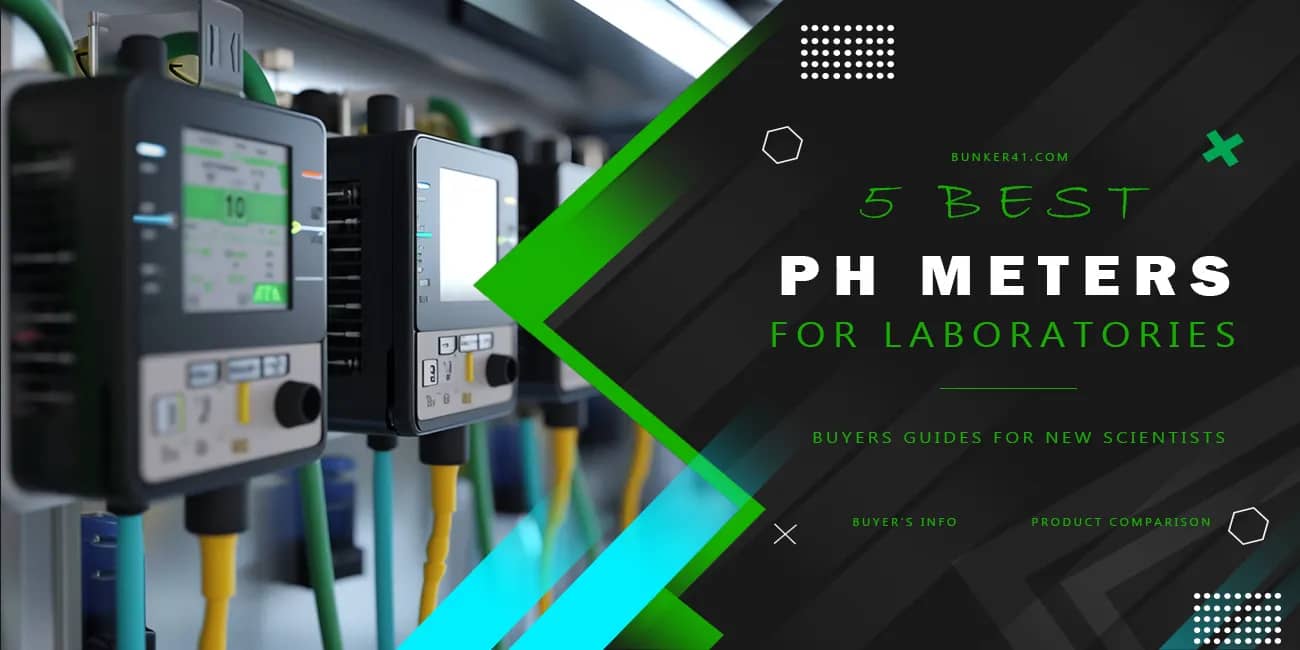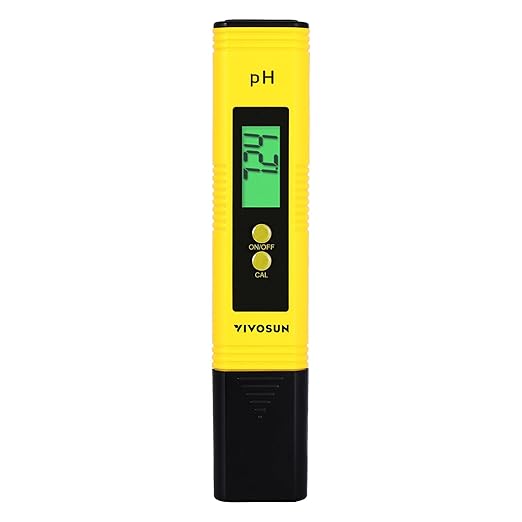Your cart is currently empty!

5 Best pH Meters For Laboratories – 2025 Buyers Guides For New Scientists
Introduction
Did you know pH is key in over 90% of labs worldwide? Choosing the right digital pH meter can change your research. It makes sure your measurements are accurate, leading to big discoveries. As a scientist, you know how important precise pH readings are. They’re vital in many fields, from checking water quality to drug research. A good pH meter is your go-to tool in the lab. This guide will help you pick the best one for your work. The world of lab tools keeps getting better. Today’s pH meters are more accurate and flexible than ever. Whether you’re an experienced researcher or just starting, knowing about pH measurement tech is key.

Choosing the right pH meter for your laboratory is crucial for ensuring precise and reliable measurements across various applications. In 2025, the market offers an array of advanced pH meters, each designed to meet the specific needs of scientists and researchers. This guide aims to provide an in-depth overview of the five best pH meters for laboratories, focusing on their features, accuracy, and usability. When it comes to selecting a pH meter, several key factors must be considered, such as digital
versus analog models, automatic temperature compensation, and the type of electrode used. Modern digital pH meters offer enhanced accuracy, with features like automatic temperature compensation and data logging capabilities, making them indispensable for environmental monitoring, water quality testing, and hydroponics. These devices often come with replaceable probes and calibration solutions to ensure consistent performance. Apera Instruments and Milwaukee are among the leading
manufacturers, known for their reliable and precise pH meters. These meters typically include a double junction electrode and a reference electrode to provide more accurate readings and reduce the risk of contamination. Calibration is a critical step in achieving accurate results, and many modern pH meters simplify this process with automatic or semi-automatic calibration features. Understanding the functionality and specifications of different pH meters is essential. For instance, a pH meter with a digital display can offer clear and immediate readings, while some models
are equipped with data logging for long-term monitoring. Additionally, pH testers designed for specific applications, such as soil, water samples, or aquariums, ensure that the measurements are both relevant and precise. The importance of proper maintenance cannot be overstated. Using the appropriate storage solution for the pH probe and regularly calibrating the device according to the manufacturer’s instructions are vital practices to extend the lifespan of the meter and maintain its accuracy. In this guide, we will explore the best pH meters available, evaluating their performance in providing accurate pH readings, their ease of use, and their suitability for various laboratory tasks. Whether you are monitoring the pH levels in drinking water, testing the alkalinity of soil, or conducting research in a laboratory setting, the right pH meter can significantly enhance the quality and reliability of your measurements. By the end of this guide, you will be equipped with the knowledge to choose the best pH meter that meets your scientific needs and ensures accurate, reliable, and consistent results.
Key Takeaways
Understanding pH Meters

“Precision in pH measurement is not a luxury—it’s a scientific necessity.”

Understanding pH meters is fundamental for anyone involved in laboratory work, as these instruments are pivotal in measuring the hydrogen ion concentration, or pH levels, of various solutions. A pH meter, whether a traditional analog model or a modern digital pH meter, operates by using a pH probe to measure the voltage difference between a reference electrode and a measuring electrode. This voltage difference is then translated into a pH value, providing accurate
readings of the solution’s acidity or alkalinity. Modern digital pH meters, such as those offered by Apera Instruments and Milwaukee, are equipped with advanced features like automatic temperature compensation, which adjusts the pH reading based on the temperature of the sample, ensuring more accurate results. These meters also come with replaceable probes and double junction electrodes that enhance the durability and precision of the measurements by preventing contamination and reducing interference from other ions in the solution. Calibration is a crucial
process to maintain the accuracy of pH meters. Regular use of calibration solutions and buffer solutions, as per the manufacturer’s instructions, ensures that the pH meter provides consistent and reliable readings. Many digital meters simplify this process with automatic or semi-automatic calibration features, making it easier for users to maintain the equipment’s accuracy. pH meters are used across various applications, from environmental monitoring and hydroponics to testing water quality and soil alkalinity. For instance, monitoring the pH levels in drinking water and aquariums ensures safe and healthy
environments, while measuring the total dissolved solids in water samples is essential for maintaining water quality. The ability to log data and monitor changes over time is another valuable feature of modern pH meters, aiding in long-term studies and research. The simplicity of operation is another important aspect of pH meters. Digital meters with clear displays and intuitive interfaces allow users to obtain accurate measurements with minimal hassle. Proper maintenance, including using the correct storage solution for the pH probe and following regular calibration routines, extends the life of the meter and ensures its
reliability. In summary, understanding how pH meters work and the importance of features like automatic temperature compensation, calibration solutions, and replaceable probes, is vital for achieving accurate and reliable pH measurements. By selecting the best pH meters for laboratories, researchers can ensure precise monitoring of pH levels in various applications, leading to more accurate results and better-informed decisions in their scientific endeavors.
The Science Behind pH Meters

Understanding the science behind pH meters is essential for leveraging their capabilities to obtain accurate measurements in laboratory settings. At the core, a pH meter is an electrochemical device designed to measure the hydrogen ion concentration, or pH level, of a solution, indicating its acidity or alkalinity. The measurement process involves a pH probe, which typically consists of a measuring electrode and a reference electrode. The measuring electrode detects the hydrogen ion activity in the
solution, while the reference electrode provides a stable voltage to compare against. Modern digital pH meters, such as those from Apera Instruments and Milwaukee, incorporate advanced technologies like automatic temperature compensation to adjust pH readings according to the temperature of the sample, ensuring precise and consistent results. These devices often feature replaceable probes and double junction electrodes, which enhance durability and prevent contamination, crucial for obtaining reliable data across various applications, from
environmental monitoring to water quality testing. Calibration is a vital aspect of pH meter functionality. Using buffer solutions to calibrate the meter according to the manufacturer’s instructions ensures the accuracy of the readings. Regular calibration compensates for any drift in the pH probe’s response, maintaining the meter’s reliability over time. Many digital meters streamline this process with automatic or semi-automatic calibration features, making it easier for users to maintain the device’s performance. The science behind pH meters extends to their practical applications. These devices are indispensable in
fields such as hydroponics, where precise pH levels are crucial for plant growth, and in environmental monitoring, where accurate pH readings help assess water quality. pH meters are also essential in laboratories for testing the total dissolved solids in water samples and ensuring the safety of drinking water. The ability to log data and monitor pH changes over time is particularly beneficial for long-term studies and research projects. The operational simplicity of modern pH meters, with their user-friendly interfaces and digital displays, allows for easy and accurate measurements. Proper maintenance, including the use
of appropriate storage solutions for the pH probe and adherence to regular calibration routines, is crucial to extend the meter’s lifespan and ensure its accuracy. In summary, the science behind pH meters involves a delicate balance of electrochemical principles, advanced technological features, and meticulous maintenance practices. By understanding these fundamentals, scientists and researchers can select the best pH meters for laboratories, ensuring accurate and reliable pH readings for a wide range of applications.
The Science of pH Measurement
At the heart of pH measurement are special electrodes. These electrodes work with liquid samples. They include:
Temperature is very important for accurate pH readings. Modern digital pH meters adjust for temperature. This ensures accurate readings in different conditions.
| Electrode Type | Key Characteristics | Best Used For |
|---|---|---|
| Glass Membrane | High sensitivity | Precise liquid measurements |
| Platinum Junction | General purpose | Standard water quality testing |
| Double-Junction Reference | Minimal contamination | Complex or challenging samples |
“Precision in measurement begins with understanding the fundamental principles behind your instruments.”
pH meters are vital in science and industry. They give quick and accurate info on the chemical makeup of solutions.
Factors to Consider When Choosing a pH Meter


Understanding the science behind pH meters is essential for leveraging their capabilities to obtain accurate measurements in laboratory settings. At the core, a pH meter is an electrochemical device designed to measure the hydrogen ion concentration, or pH level, of a solution, indicating its acidity or alkalinity. The measurement process involves a pH probe, which typically consists of a measuring electrode and a reference electrode. The measuring electrode detects the hydrogen ion
activity in the solution, while the reference electrode provides a stable voltage to compare against. Modern digital pH meters, such as those from Apera Instruments and Milwaukee, incorporate advanced technologies like automatic temperature compensation to adjust pH readings according to the temperature of the sample, ensuring precise and consistent results. These devices often feature replaceable probes and double junction electrodes, which enhance durability and prevent contamination, crucial for obtaining
reliable data across various applications, from environmental monitoring to water quality testing. Calibration is a vital aspect of pH meter functionality. Using buffer solutions to calibrate the meter according to the manufacturer’s instructions ensures the accuracy of the readings. Regular calibration compensates for any drift in the pH probe’s response, maintaining the meter’s reliability over time. Many digital meters streamline this process with automatic or semi-automatic calibration features, making it easier for users to maintain the device’s performance. The science behind pH meters extends to their practical applications.
These devices are indispensable in fields such as hydroponics, where precise pH levels are crucial for plant growth, and in environmental monitoring, where accurate pH readings help assess water quality. pH meters are also essential in laboratories for testing the total dissolved solids in water samples and ensuring the safety of drinking water. The ability to log data and monitor pH changes over time is particularly beneficial for long-term studies and research projects. The operational simplicity of modern pH meters, with their user-friendly interfaces and digital displays, allows for easy and accurate measurements.
Proper maintenance, including the use of appropriate storage solutions for the pH probe and adherence to regular calibration routines, is crucial to extend the meter’s lifespan and ensure its accuracy. In summary, the science behind pH meters involves a delicate balance of electrochemical principles, advanced technological features, and meticulous maintenance practices. By understanding these fundamentals, scientists and researchers can select the best pH meters for laboratories, ensuring accurate and reliable pH readings for a wide range of applications.
Accuracy and Precision
When it comes to selecting the best pH meters for laboratories, accuracy and precision are paramount. These attributes are critical for ensuring that the pH levels measured are as close to the true value as possible, which is essential for applications ranging from environmental monitoring to hydroponics and water quality testing. Modern digital pH meters, like those from Apera Instruments and Milwaukee, are designed with advanced features such as automatic temperature compensation and double junction electrodes, which significantly enhance the accuracy of pH readings by adjusting for temperature variations and
minimizing contamination. The accuracy of a pH meter is largely dependent on its calibration. Regular calibration with high-quality buffer solutions is essential to maintain the integrity of the readings. Digital pH meters often include automatic or semi-automatic calibration solutions, simplifying the calibration process and ensuring consistent results. These devices also come equipped with replaceable probes, allowing for sustained accuracy over extended use. Precision in pH meters refers to the repeatability of measurements. High precision ensures that repeated tests under the same conditions yield the same
results, which is crucial for scientific experiments and quality control processes. The incorporation of reference electrodes and data logging capabilities in digital meters aids in achieving precise and reliable measurements. These features are particularly beneficial for long-term studies and continuous monitoring, where maintaining consistent and accurate data is crucial. Furthermore, pH meters must be capable of providing accurate readings across a wide range of applications. Whether measuring the pH levels in drinking water, soil, or aquarium water, the meter should offer versatility and reliability. High-
quality pH meters are designed to handle various environmental conditions and sample types, ensuring accurate and precise measurements irrespective of the application. In summary, the accuracy and precision of pH meters are fundamental to their effectiveness in laboratory settings. By understanding and leveraging advanced features like automatic temperature compensation, regular calibration with buffer solutions, and the use of replaceable probes, scientists can achieve accurate results that are essential for their research and quality control activities.
Ease of Use and Maintenance
Pro Tip: Regular calibration and proper electrode care are essential for consistent, reliable pH measurements.

When selecting the best pH meters for laboratories, ease of use and maintenance are critical factors that ensure efficient and reliable operation. Modern digital pH meters, such as those from Apera Instruments and Milwaukee, are designed with user-friendly interfaces that simplify the process of obtaining accurate pH readings. Features like clear digital displays and intuitive controls make it easy for new scientists to quickly grasp the operation of these devices, reducing the learning
curve and minimizing errors in measurements. One of the standout features in these advanced pH meters is automatic temperature compensation, which adjusts the pH readings based on the temperature of the sample. This not only enhances accuracy but also simplifies the process for users, as they do not need to manually correct for temperature variations. Additionally, many digital pH meters come equipped with replaceable probes and double junction electrodes, which not only provide more accurate readings but also make maintenance
straightforward. Replaceable probes mean that the device’s lifespan can be extended without the need for complete replacement, making it a cost-effective solution for laboratories. Calibration is another aspect where ease of use plays a significant role. High-quality pH meters often include automatic or semi-automatic calibration features that utilize buffer solutions to ensure the device remains accurate over time. This reduces the manual effort required to maintain the meter’s performance and ensures consistent results. Following the manufacturer’s instructions for calibration and using the
recommended calibration solutions can significantly improve the longevity and reliability of the pH meter. Maintenance involves proper care of the pH probe, including using the correct storage solution to keep the electrode hydrated and functional. Regular cleaning and calibration are essential to maintain the accuracy of the readings. Digital meters with data logging capabilities also facilitate maintenance by allowing users to track performance over time and identify when recalibration or probe replacement is necessary. The versatility of these pH meters is also a key consideration. They are designed to handle a variety
of applications, from testing the pH levels of drinking water and soil to monitoring water quality in aquariums and hydroponics systems. This adaptability ensures that the pH meters are suitable for diverse laboratory needs, providing accurate measurements across different sample types. In summary, the ease of use and maintenance of pH meters are crucial for ensuring their effectiveness in laboratory settings. With features like automatic temperature compensation, replaceable probes, and user-friendly calibration solutions, these devices are designed to provide accurate results with minimal hassle. By choosing
pH meters that are easy to operate and maintain, new scientists can focus on their research with confidence, knowing that their equipment will deliver reliable and precise measurements.
5 Best pH Meters For Laboratories

In the ever-evolving landscape of scientific research, precision and reliability are non-negotiable, especially when it comes to measuring pH levels in laboratories. Whether you’re conducting complex biochemical assays, monitoring environmental changes, or ensuring the quality of drinking water, the right pH meter can make all the difference in obtaining accurate results. pH meters work by detecting the hydrogen ion concentration in a solution, a fundamental parameter that influences chemical reactions, biological systems, and industrial processes. Modern digital pH meters are designed with advanced features such as
automatic temperature compensation, high-sensitivity electrodes, and data logging capabilities to provide accurate pH readings under various conditions. Many laboratory-grade pH meters also feature a double junction electrode to minimize contamination, ensuring longevity and precise measurements. Calibration remains a crucial aspect of pH testing, requiring the use of buffer solutions to maintain accuracy over time. Proper care, including using the correct storage solution and following the manufacturer’s instructions, extends the lifespan of the pH probe and guarantees more accurate results. From handheld
testers to benchtop meters with replaceable probes, the market offers a wide range of options suited for different applications, including hydroponics, soil testing, aquarium monitoring, and industrial quality control. With leading brands like Apera Instruments and Milwaukee setting the standard for laboratory pH meters, it’s essential to select an instrument that meets your specific needs. In this guide, we’ll explore the 5 best pH meters for laboratories. evaluating their accuracy, ease of calibration, durability, and overall performance to help both new scientists and experienced researchers make informed
decisions.
1. Apera Instruments AI209 Value Series pH Meter
When it comes to reliable and accurate pH measurements in laboratories, the Apera Instruments AI209 Value Series pH Meter stands out as the top choice for 2025. This digital pH meter is celebrated for its simple operation and exceptional precision, making it a favorite among new scientists and seasoned professionals alike. Equipped with a replaceable pH probe and automatic temperature compensation, this device ensures
accurate pH readings across a wide range of applications, from hydroponics to water quality monitoring. The Apera Instruments AI209 features a double junction electrode, which enhances the meter’s durability and lifespan by preventing contamination of the reference electrode. This design, along with the ability to use calibration solutions, ensures that the meter remains accurate over time, providing consistent results for
various testing needs. Whether you’re measuring the pH levels of drinking water, soil, or even aquarium environments, this meter delivers reliable data logging capabilities and precise measurements. One of the standout features of the Apera Instruments AI209 is its ability to provide accurate readings with minimal fuss. The meter’s digital display is easy to read, and the included calibration solutions and storage solution
simplify the calibration process, ensuring the meter is always ready for the next test. The manufacturer’s instructions are clear and straightforward, making it an ideal choice for those new to using pH meters. Additionally, the AI209’s robust construction and quality materials make it suitable for various environmental monitoring tasks. Its accurate measurements are crucial for maintaining proper alkalinity and hydrogen ion
concentration in different samples, ensuring that total dissolved solids and pH levels are monitored effectively. Whether in a lab setting or fieldwork, the Apera Instruments AI209 Value Series pH Meter proves to be an indispensable tool for obtaining accurate and reliable pH measurements.
Buy On Amazon- Affordability: Offers high-quality features at a competitive price point, making it accessible for various budgets.
- Ease of Use: Simplifies pH testing with straightforward calibration and operation, suitable for users with varying experience levels.
- Portability: Compact and lightweight design, complemented by a carrying case, facilitates on-the-go testing.
- Durability: Waterproof and dustproof construction ensures reliable performance in diverse environments.
- Limited Resolution: With a resolution of 0.1 pH, it may not suffice for applications requiring more precise measurements
- Non-Replaceable Probe: The fixed probe design means that the entire unit requires replacement upon probe failure, potentially increasing long-term costs.
The Apera Instruments AI209 PH20 is competitively priced, typically ranging between $50 and $70, depending on the retailer and any included accessories.
The Apera Instruments AI209 PH20 stands out as a reliable and cost-effective digital pH meter, ideal for general-purpose pH testing across various industries. Its user-friendly interface, automatic temperature compensation, and durable design make it particularly suitable for new scientists and professionals seeking accurate pH measurements without a substantial investment. However, for applications demanding higher resolution or a replaceable probe, alternative models may be more appropriate. For a visual overview and user experiences with the Apera PH20, you
might find the following video review insightful:
2. Milwaukee MW102 pH and Temperature Meter
When it comes to selecting the best pH meters for laboratories in 2025, this model is second in line: the Milwaukee MW102 pH and Temperature Meter. The Milwaukee MW102 pH and Temperature Meter is the go-to choice for advanced research. This meter excels in providing highly accurate readings thanks to its high-quality pH probe and robust design. It not only measures pH levels but also monitors temperature, which
is crucial for precise pH measurements. The MW102’s automatic temperature compensation and comprehensive data logging capabilities make it indispensable for detailed environmental monitoring and laboratory research. It supports a wide range of applications, from measuring the alkalinity and acidity of water samples to ensuring the correct hydrogen ion concentration in buffer solutions. Both meters stand out in their
respective categories, with the Apera Instruments AI209 being ideal for everyday laboratory use and educational settings due to its simple operation and reliable accuracy. In contrast, the Milwaukee MW102 is perfect for more complex and demanding research environments, offering advanced features that ensure meticulous monitoring and data recording. Together, these pH meters represent the pinnacle of current pH testing
technology, providing users with the tools they need for accurate and reliable measurements in various scientific contexts.
Buy On Amazon- High Accuracy: Delivers precise measurements suitable for critical applications.
- Automatic Temperature Compensation: Ensures accurate pH readings across varying temperatures.
- Dual Measurements: Simultaneously measures pH and temperature, offering comprehensive data.
- Durable Build: Designed to withstand rigorous use in diverse environments.
- Separate Probes: Requires handling of individual pH and temperature probes, which may be less convenient compared to integrated designs.
- Calibration Maintenance: Regular calibration with appropriate solutions is necessary to maintain accuracy.
The Milwaukee MW102 is competitively priced, typically ranging between $100 and $150, depending on the retailer and included accessories.
The Milwaukee MW102 pH and Temperature Meter is a reliable and precise instrument suitable for professionals across various industries. Its high accuracy, automatic temperature compensation, and durable design make it a valuable tool for applications requiring meticulous pH and temperature monitoring. While the need for separate probes may require additional handling, the MW102‘s performance and reliability outweigh this minor inconvenience, making it a worthy investment for accurate measurements. For a visual overview and user experiences with the Milwaukee
MW102, you might find the following video review insightful:
3. VIVOSUN Digital pH Meter
For those seeking a reliable and cost-effective solution in the world of pH testing, the VIVOSUN Digital pH Meter stands out as the best budget option for laboratories in 2025. This digital pH meter, while affordable, does not compromise on accuracy or functionality, making it an excellent choice for new scientists and those working within tight budgets. The VIVOSUN Digital pH Meter offers precise pH readings, thanks to its
advanced pH probe and simple calibration solutions. Its digital display ensures easy readability, and the meter’s straightforward operation makes it accessible to users of all experience levels. The VIVOSUN Digital pH Meter includes features typically found in more expensive models, such as automatic temperature compensation, which adjusts readings to account for temperature variations, ensuring accurate results. This feature is
particularly valuable in environmental monitoring, water quality testing, and hydroponics, where temperature fluctuations can significantly impact pH levels. The device also supports a wide range of applications, from testing the pH levels of drinking water and soil to monitoring the alkalinity in aquariums and plants. Despite its budget-friendly price, the VIVOSUN Digital pH Meter does not skimp on quality. It provides
consistent and accurate measurements, which are essential for maintaining proper hydrogen ion concentration and monitoring total dissolved solids in various water samples. The included manufacturer’s instructions guide users through the calibration process, ensuring the meter is always ready for precise testing. Additionally, the compact and portable design makes it an ideal tool for fieldwork and laboratory settings alike. In
summary, the VIVOSUN Digital pH Meter delivers exceptional value, combining affordability with high performance. It stands out in the competitive market of pH meters, offering reliable data logging, simple operation, and accurate readings across a range of testing conditions. Whether you are monitoring water quality, conducting soil tests, or engaged in hydroponic research, this digital pH meter is a worthy investment
that guarantees accurate pH measurements without breaking the bank.
Buy On Amazon- Affordability: Provides accurate pH measurements at a budget-friendly price point.
- Ease of Use: Simple operation with automatic calibration makes it accessible for users with varying experience levels.
- Portability: Compact design allows for convenient use in different settings, from laboratories to fieldwork..
- Lack of Automatic Temperature Compensation (ATC): Does not adjust pH readings based on temperature variations, which may affect accuracy in fluctuating temperature conditions.
- Build Quality: May not be as durable as higher-end models, requiring careful handling to ensure longevity.
The VIVOSUN Digital pH Meter is competitively priced, typically ranging between $10 and $20, making it an economical choice for basic pH testing needs.
The VIVOSUN Digital pH Meter is an excellent entry-level tool for individuals and professionals seeking an affordable solution for pH measurement. Its high accuracy, automatic calibration, and portability make it suitable for various applications, including hydroponics, drinking water testing, and soil analysis. However, the absence of automatic temperature compensation and a potentially less robust build suggest it is best suited for applications where temperature remains constant, and careful handling is feasible. Overall, it offers substantial value for its price point, particularly for users with basic pH testing requirements.
4. Bluelab pH Pen
When it comes to water quality testing, the Bluelab pH Pen stands out as an exemplary choice in the 2025 lineup of best pH meters for laboratories. This digital pH meter, designed with precision and simplicity in mind, is particularly effective for monitoring the pH levels of water samples, ensuring accurate and reliable results. The Bluelab pH Pen features automatic temperature compensation, which adjusts readings to account for
temperature fluctuations, a crucial factor in obtaining precise pH measurements in diverse environments. Its compact and portable design makes it an ideal tool for fieldwork, whether you’re testing drinking water, monitoring aquariums, or conducting environmental assessments. The Bluelab pH Pen is equipped with a high-quality pH probe that provides accurate pH readings and ensures consistent performance over
time. The device includes easy-to-follow manufacturer’s instructions and calibration solutions, simplifying the calibration process and ensuring the meter is always ready for accurate testing. Its digital display is clear and intuitive, allowing users to quickly and efficiently measure the pH levels of various liquids, from hydroponics solutions to fish tank water. What sets the Bluelab pH Pen apart is its robustness and reliability in
delivering accurate measurements under a range of conditions. The meter’s double junction electrode design enhances durability and longevity, reducing the risk of contamination and ensuring stable readings. This feature, combined with its ability to measure total dissolved solids and hydrogen ion concentration, makes it a valuable tool for both professional laboratories and casual users aiming to maintain optimal water
quality. In summary, the Bluelab pH Pen excels in water quality testing, offering a blend of accuracy, ease of use, and durability. Its comprehensive features and reliable performance make it a top pick for anyone needing precise pH monitoring in water samples, whether for environmental monitoring, aquarium maintenance, or hydroponic gardening. This digital pH meter proves that high-quality, accurate readings
are accessible and straightforward, reinforcing its status as a recommended product in the realm of pH testers.
Buy On Amazon- High Accuracy: Delivers precise pH readings, crucial for applications requiring exact measurements.
- Durable Construction: Designed to withstand harsh environments, making it suitable for both laboratory and field use.
- User-Friendly: Features like automatic calibration and a backlit display enhance ease of use.
- Price Point: Higher cost compared to basic pH meters, which may be a consideration for budget-conscious users.
- Maintenance: Requires regular cleaning and proper storage of the probe to maintain accuracy and prolong lifespan.
The Bluelab pH Pen is positioned in the mid to high price range, reflecting its advanced features and durability. Prices typically range from $70 to $100, depending on the retailer and any additional accessories included.
The Bluelab pH Pen stands out as a reliable and accurate digital pH meter suitable for professionals and serious enthusiasts across various industries. Its features, such as automatic temperature compensation, a replaceable probe, and a backlit display, contribute to its reputation for precision and durability. While the initial investment is higher than some basic models, the long-term benefits and reduced maintenance costs make it a worthwhile investment for those requiring dependable pH measurements.
5. Hanna Instruments HI98121 pH/ORP/Temperature Tester
For laboratories seeking a versatile and reliable tool, the Hanna Instruments HI98304 DIST4 EC and TDS Tester stands out as the best option in 2025. This innovative meter excels in measuring electrical conductivity (EC) and total dissolved solids (TDS), making it a valuable addition to any laboratory’s toolkit. Its versatility extends across various applications, from environmental monitoring to hydroponics, ensuring accurate
results regardless of the testing conditions. The HI98304 features automatic temperature compensation, which adjusts readings based on temperature fluctuations, thus providing consistent and precise measurements. The Hanna Instruments HI98304 is designed for ease of use, featuring a digital display that offers clear and quick readings. The meter’s simple operation is complemented by its robust construction,
ensuring durability and reliability even in demanding environments. This tester includes a high-quality probe that delivers accurate readings of water quality, pH levels, and total dissolved solids, crucial for maintaining optimal conditions in aquariums, drinking water, and soil samples. In addition to its practical features, the HI98304 comes with manufacturer’s instructions and calibration solutions, simplifying the calibration process
and ensuring the meter is always ready for accurate testing. The replaceable probe enhances the device’s longevity, reducing maintenance costs and making it a cost-effective choice for laboratories. Its compact design makes it portable, ideal for fieldwork and laboratory settings alike. The Hanna Instruments HI98304 DIST4 EC and TDS Tester proves that versatility does not have to come at the expense of accuracy. It
provides reliable data logging capabilities, allowing for detailed analysis and monitoring over time. Whether you are testing the hydrogen ion concentration, assessing total dissolved solids, or ensuring the proper alkalinity of your water samples, this tester delivers consistent and accurate results. Its blend of functionality, durability, and ease of use makes it a top pick for laboratories looking for a versatile and dependable pH meter.
Buy On Amazon- Comprehensive Measurements: Simultaneously measures pH, ORP, and temperature, reducing the need for multiple instruments.
- Durable and Waterproof: Suitable for use in wet and demanding environments.
- User-Friendly Interface: Simple operation with clear LCD display.
- Calibration Frequency: Requires regular calibration to maintain accuracy, which may be time-consuming.
- Electrode Maintenance: Proper care and storage of the electrode are essential to prevent damage and ensure longevity.
The HI98121 is positioned in the mid to high price range, reflecting its multifunctionality and robust design. Prices may vary depending on the retailer and region.
The Hanna Instruments HI98121 pH/ORP/Temperature Tester is a reliable and versatile instrument suitable for professionals requiring accurate measurements of pH, ORP, and temperature. Its durable, waterproof design and replaceable electrode make it a cost-effective choice for various applications. However, users should be prepared to perform regular calibration and maintenance to ensure optimal performance.
Real-World Applications: From Laboratories to Fieldwork


The versatility of modern pH meters extends far beyond the confines of the laboratory, making them indispensable tools for a wide array of real-world applications. From precise measurements in controlled lab environments to rugged fieldwork, the best pH meters for laboratories are designed to deliver accurate results across diverse conditions. Equipped with features such as automatic temperature compensation, digital displays, and data logging capabilities, these instruments
provide reliable and consistent pH readings crucial for various scientific and industrial purposes. In laboratory settings, digital pH meters are essential for tasks ranging from testing the pH levels of buffer solutions to monitoring the hydrogen ion concentration in water samples. Their high accuracy and precision are vital for research in chemistry, biology, and environmental science. The use of calibration solutions and reference electrodes ensures that the pH readings are consistently accurate, which is crucial
for experiments that require meticulous control over-acidity and alkalinity levels. Field applications of pH meters are equally significant. Environmental monitoring, for example, relies heavily on these devices to assess the pH levels of soil and water in different ecosystems. Accurate pH readings help scientists understand the health of aquatic environments and the impact of pollutants. Portable digital pH meters with replaceable probes and storage solutions are particularly useful in these scenarios, as they can withstand varying temperatures and conditions while providing reliable data. In agriculture, pH meters play a crucial
role in soil testing and hydroponics. Farmers and horticulturists use these devices to measure soil pH levels, ensuring optimal growing conditions for plants. Accurate pH measurements help in adjusting soil alkalinity or acidity, which can significantly affect crop yield and quality. Hydroponic systems, which rely on precise control of nutrient solutions, benefit immensely from digital pH meters that offer real-time monitoring and data logging. Water quality testing is another critical application of pH meters. These devices are used to monitor the pH levels in drinking water, ensuring it is safe for consumption. They also help
in maintaining the appropriate pH levels in aquariums, preventing harm to aquatic life. pH testers designed for these purposes come with simple operation interfaces, making them easy to use even for non-experts. Industrial applications include monitoring the pH levels in manufacturing processes, wastewater treatment, and quality control of various products. pH meters ensure that the processes are within the specified pH range, thereby maintaining product quality and compliance with environmental regulations. In summary, the real-world applications of pH meters are vast and varied. Whether in laboratories or
fieldwork, these devices provide accurate and reliable pH readings essential for scientific research, environmental monitoring, agriculture, water quality testing, and industrial processes. By choosing the best pH meters for their needs, scientists and professionals can ensure they have the right tools to achieve precise measurements and make informed decisions.
Laboratory Research

In the realm of laboratory research, the precision and reliability of pH meters are paramount. These sophisticated devices are indispensable tools that enable scientists to measure the hydrogen ion concentration in various solutions, providing accurate readings of pH levels. The best pH meters for laboratories, such as those from Apera Instruments and Milwaukee, incorporate advanced features like automatic temperature compensation and double junction electrodes to ensure accurate and
consistent results across a wide range of research applications. A critical aspect of laboratory pH meters is their ability to provide precise and accurate readings. This is achieved through the use of high-quality pH probes and reference electrodes, which are calibrated regularly using buffer solutions to maintain their accuracy. Calibration solutions are essential for correcting any deviations and ensuring that the pH meters deliver reliable data, which is crucial for experiments that require strict control over pH levels. Digital pH meters are particularly valued in laboratory
settings for their ease of use and advanced functionalities. Features such as data logging allow researchers to track pH measurements over time, facilitating long-term studies and ensuring comprehensive data collection. The digital displays provide clear and immediate readouts, reducing the likelihood of user error and enhancing the efficiency of the research process. These pH meters are used in various laboratory applications, from environmental monitoring to water quality testing. For instance, measuring the total dissolved solids in water samples and ensuring the appropriate pH levels in drinking
water are critical tasks that rely on the accuracy of these instruments. In fields like hydroponics and soil testing, pH meters help researchers optimize the conditions for plant growth by providing precise measurements of soil alkalinity and acidity. The versatility of pH meters also extends to their maintenance and durability. Replaceable probes and proper storage solutions ensure that the meters remain functional and accurate over extended periods. Following the manufacturer’s instructions for calibration and maintenance, such as using the correct storage solution for the pH probe, can significantly extend the lifespan of
these devices and maintain their accuracy. In summary, laboratory research demands the highest levels of precision and reliability from pH meters. By choosing the best pH meters for laboratories, scientists can ensure they have the tools necessary to obtain accurate results and advance their research with confidence. The integration of advanced features, ease of use, and robust maintenance practices makes these pH meters essential equipment in any modern laboratory.
Environmental Monitoring
Accurate pH measurement is the cornerstone of scientific discovery and environmental stewardship.

Environmental monitoring is a critical application of pH meters, as these devices play an essential role in assessing the health of various ecosystems. The best pH meters for laboratories are equipped with features that ensure accurate and reliable measurements, making them indispensable for monitoring water quality, soil acidity, and alkalinity. Digital pH meters, such as those from Apera Instruments and Milwaukee, incorporate automatic temperature compensation and data
logging capabilities, allowing scientists to obtain precise pH readings across different environmental conditions. Accurate pH readings are crucial for evaluating the hydrogen ion concentration in water samples, which can indicate the presence of pollutants or other environmental changes. For instance, monitoring the pH levels of drinking water ensures its safety for consumption, while assessing the pH of natural water bodies helps in understanding the impact of acid rain and other environmental factors.
Digital pH meters with replaceable probes and double junction electrodes provide durable and consistent performance, essential for long-term environmental monitoring projects. Calibration is a key factor in maintaining the accuracy of pH meters in environmental monitoring. Using high-quality calibration solutions and following the manufacturer’s instructions for regular calibration ensures that the pH meter provides reliable data. This is particularly important when measuring pH levels in various samples, from total dissolved solids in water to soil samples in agriculture. The ability to log data and track changes
over time allows scientists to detect trends and make informed decisions about environmental health. In addition to their accuracy, pH meters designed for environmental monitoring must be robust and easy to use in the field. Features like simple operation interfaces and clear digital displays make it easier for researchers to conduct tests in various conditions, from remote aquatic environments to urban settings. Proper maintenance, including using the correct storage solution for the pH probe, is vital to ensure the longevity and reliability of the device. The versatility of these pH meters extends to a wide range of
environmental applications. In hydroponics, for example, precise control of nutrient solutions is necessary for optimal plant growth, requiring accurate and consistent pH measurements. In soil testing, pH meters help farmers adjust soil pH levels to improve crop yield and quality. These applications highlight the importance of using high-quality pH meters that deliver accurate results across different environmental contexts. In summary, environmental monitoring relies heavily on the precision and reliability of pH meters. By using the best pH meters for laboratories, equipped with advanced features and robust
construction, scientists can ensure accurate measurements of pH levels in water, soil, and other environmental samples. This enables informed decision-making and effective management of environmental health, contributing to the sustainability and protection of our ecosystems.
Conclusion: Making an Informed Choice

A pH meter is more than a tool – it’s a critical partner in scientific discovery.
Selecting the best pH meter for laboratories is a critical decision that hinges on understanding the specific needs of your applications and the advanced features that modern pH meters offer. With the plethora of options available, such as those highlighted by Apera Instruments and Milwaukee, it’s essential to focus on key factors like automatic temperature compensation, data logging capabilities, and the quality of the pH probe. These features ensure that the pH meter delivers accurate readings and reliable performance across various environments, from controlled laboratory settings to rugged
fieldwork. When choosing a pH meter, consider the importance of calibration solutions and regular maintenance. Accurate calibration is crucial for obtaining precise measurements, and using high-quality buffer solutions as per the manufacturer’s instructions can significantly enhance the reliability of the readings. Additionally, pH meters with replaceable probes and double junction electrodes offer greater durability and longer lifespan, making them a cost-effective investment for laboratories. The versatility of pH meters in environmental monitoring, water quality testing, and agricultural applications
underscores their importance. Whether measuring the total dissolved solids in drinking water, monitoring pH levels in hydroponic systems, or testing soil alkalinity, the right pH meter can provide the accurate data needed for informed decision-making. Features like simple operation, clear digital displays, and robust construction further enhance the usability of these devices, making them suitable for both new scientists and experienced researchers. In summary, making an informed choice about which pH meter to purchase involves evaluating the device’s accuracy, ease of use, maintenance requirements, and
application versatility. By selecting a high-quality digital pH meter with the right features, scientists can ensure precise measurements and reliable performance, thereby advancing their research and contributing to better environmental and quality control outcomes. The 2025 buyers guide aims to equip new scientists with the knowledge needed to choose the best pH meters for their laboratories, ensuring they have the tools necessary for accurate and effective scientific analysis.
Summary
Selecting the best pH meters for laboratories involves a careful evaluation of the features and functionalities that ensure accurate and reliable measurements. The 2024 buyers guide for new scientists highlights top choices such as those from Apera Instruments and Milwaukee, known for their precision and advanced capabilities. These digital pH meters incorporate essential features like automatic temperature compensation, which adjusts readings based on sample temperature, and data logging for tracking measurements over time. Accurate pH readings are facilitated by high-quality pH probes and double junction
electrodes, which reduce contamination and provide reliable results. Regular calibration using appropriate calibration solutions is critical to maintaining the accuracy of pH meters. Following the manufacturer’s instructions for calibration and maintenance, including using correct storage solutions for pH probes, extends the lifespan and performance of these devices. The versatility of pH meters allows them to be used across various applications, from environmental monitoring and water quality testing to soil analysis and hydroponics. They measure pH levels, total dissolved solids, and hydrogen ion concentration in water
samples, ensuring the safety and quality of drinking water and optimal conditions for plant growth. Digital pH meters offer simple operation with clear digital displays, making them user-friendly even for new scientists. Replaceable probes add to their convenience, allowing for prolonged use without the need for complete replacements. The importance of accurate readings cannot be overstated, as they are essential for research accuracy and quality control. Whether in the laboratory or fieldwork, these pH meters provide the reliability and precision needed for scientific analysis, contributing to informed decision-making
and better environmental management. In conclusion, the 2024 buyers guide for the best pH meters for laboratories equips new scientists with the knowledge to make informed choices. By considering factors such as automatic temperature compensation, calibration solutions, and the versatility of application, researchers can select pH meters that offer accurate results and durable performance. This ensures their scientific endeavors are supported by reliable data, advancing research and environmental sustainability.
FAQ
Futher Resources For More Reading
Follow Us
Related Articles
Gallery
Site Built By Kadence
Copyright@2025 Bunker41 – All Rights Reserved


















